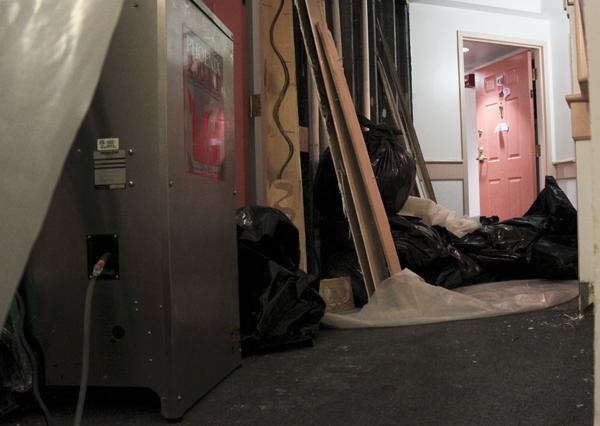Updated: Oct. 15 at 10:36 a.m.
The number of fires reported on the Foggy Bottom Campus doubled over a three-year period, with more than half of the incidents caused by kitchen appliances.
Students reported 18 fires last year, up from nine in 2010, according to data released this month. In three years, the University logged a total of 40 fires, which caused at least $279,000 in total property damages and a couple of minor injuries. Half started in ovens, microwaves or on stoves.
The most fires were reported in Ivory Tower, JBKO Hall and 1959 E St., which all include in-room kitchens, as well as in Thurston Hall, the largest first-year residence hall.
William Flint, director of GW’s Office of Health and Safety, said in an email that his department is “aware” of the increase in fires and is “monitoring” several factors that might be causing it, though he did not explain those factors.
GW has added only a handful of kitchens to residence halls since 2010, the communal kitchens on each floor of West Hall on the Mount Vernon Campus.
Flint added that the University has recently expanded fire prevention and fire extinguisher training for house staff members.
University Police Department Chief Kevin Hay said the majority of fires are caused by “somebody reheating a pizza in a pizza box and then forgetting about it. Then this smoke comes rolling out of the oven.”
Other fires have started because of grease, incense or candles. Two fires began when a person placed burning items in trash chutes, causing up to $1,000 in damages.
Only two fires resulted in injuries. A dryer caught fire in The Dakota last September, sending one student to GW Hospital for smoke inhalation. That fire caused between $25,000 and $50,000 in property damages, according to GW’s annual fire safety report, though D.C.’s fire agency reported that it cost about $340,000.
That fire caused between $25,000 and $50,000 in property damages, according to GW’s annual fire safety report, though D.C.’s fire agency reported that it cost about $340,000.
University spokeswoman Michelle Sherrard said the cost the city reported was “an estimate based on the type of building and the area affected by the fire,” while the amount listed in GW’s report represented the money the University spent to clean and repair the damage.
Residents of the Dakota room reported that their smoke detector failed to go off, according to a D.C. Fire and EMS report, though University spokeswoman Michelle Sherrard told The Hatchet at the time that all emergency systems were functioning when the fire occurred.
The other injury occurred in the City Hall parking garage last year when a dumpster caught fire, causing between $1,000 and $10,000 in property damages.
A fire at the Zeta Beta Tau townhouse in 2011 racked up the most in property damages, with costs between $250,000 and $500,000, according to GW’s report. The townhouse, located at 605 21st St., reopened a year later.
Sean Lynch, a member of Zeta Beta Tau, said the fire started when the cord from a bathroom fan sparked and lit dust on fire. Flames reached buckets of tar that were left in the attic during construction and exploded.
“Originally they said there was going to be very little damage, but the next day when we went inside, there was furniture thrown out of the windows. I guess that’s how they keep the fire from spreading,” Lynch said, adding that two TV sets were stolen from the townhouse after the fire.
The University has responded to five fires this calendar year, including one bulletin board fire in Madison Hall in May. UPD labeled the incident as an open arson case.
“It seems like every year, we’ll get one case where a student or somebody will see something on a bulletin board that they don’t like. There’ll be a piece of paper stapled to a bulletin board and they’ll set that on fire,” Hay said.








